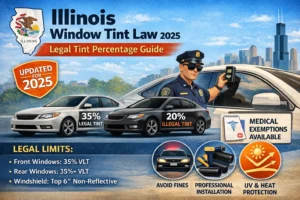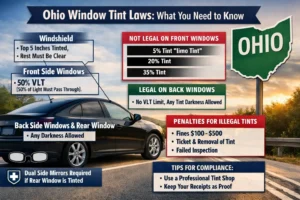Driving in Georgia comes with the responsibility of understanding and obeying state traffic laws, particularly those which specially exist for first responders and emergency workers. To protect these honorable workers, Georgia Move Over Law, which still remains much misunderstood, if ever regarded seriously, by many drivers across the state. Therefore, whether you are a local resident or just driving through the Peach State, any knowledge of what this law entails can keep you safe and others too.
The intention of the Move Over Law Georgia requirements is to minimize injuries and fatalities among police officers, paramedics, tow truck operators, and utility workers who are often exposed to dangerous situations when working on or beside the roadside. Let’s get better acquainted with what the law encompasses, who are the people it protects, and consequences for violations.
What is the Georgia Move Over Law?
Put on the books to protect emergency and utility personnel carrying out their duties at the side of the road, the Georgia driving laws move over-spelled the Spencer Pass Law-requires motorists to change lanes or reduce speed when approaching a legitimate stopped vehicle displaying flashing lights.
This law was passed in 2003 and strengthened thereafter, and is named for Georgia State Trooper Spencer Pass, who was killed by a passing vehicle while helping a stranded motorist. The purpose is simple: move over or slow down to give roadside workers a safe place to operate.
What Does the Law Require from Drivers?
What does the Georgia Move Over Law require? When you see any authorized emergency vehicle or service vehicle, police, fire, EMS, utility, HERO units, or tow—parked by the road with lights flashing, you must act. When driving on a multi-lane highway, you must move over into the neighboring lane, safely.
If you cannot change lanes due to heavy traffic or road conditions, you must slow down. As a general rule, more reasonable than the posted limit would do. Be prepared to stop if circumstances require it. This law is in effect any hour of the day or night, and violations may carry heavy fines.
Move Over Law for Emergency Vehicles
Georgia’s laws widen up to different areas and are not solely reserved for police and fire services. A few examples of types of vehicles for which you need to move over include. Vehicles Requiring Move Over:
- Law enforcement agency vehicles flashing either blue or red lights
- Fire trucks and EMS vehicles
- Tow trucks and HERO units equipped with amber flashing lights
- Flashing lights utility and maintenance vehicles
- DOT and roadside assistance vehicles.
Once any of these vehicles are stopped on the shoulder or a lane of the road, the move over for emergency vehicles Georgia rule goes into effect. It is a provision that assures safety for those who risk their lives to assist others on the road.
Georgia Highway Move Over Law Explained
Georgia highway move over law covers only high-speed, multi-lane roads, such as I-75, I-285, as well as any interstate or major state highways. This is due to the increased risk on the workers because of the high speed and volume of traffic.
If you are driving on a highway while spotting an emergency vehicle having an accident roadside, then you must empty the last lane nearest to the emergency vehicle-if possible. If it’s not possible to move over, then reduce your speed considerably, that is, 10-20 mph below speed limit, depending on traffic and weather conditions.
Move Over Law Requirements for Motorists
Here is the summarized Georgia motorist move over law that all drivers must comply with:
- Change lanes away from emergency or service vehicles when traveling on a highway or multi-lane road.
- If you can’t change lanes safely, slow down to below the posted speed limit.
- Yield to an emergency vehicle entering or within your lane.
- Don’t accelerate until the scene or vehicle at the roadside is completely in your rearview mirror.
- Pay attention and keep distractions aside when going through emergency events.
These Georgia Move Over Law requirements are not just suggestions: they are enforced by state troopers and local law enforcement, who regularly monitor compliance.
Penalties for Violating the Move Over Law
Not following Move Over Law Georgia penalizes violations. A first offense may result in a fine of up to $500 and three points on your driver’s license. Serious cases, mostly in instances involving injury or death, can also have criminal charges pressed against the violator.
Such fines are not conditioned by the punishment of irresponsible conduct only but to develop a kind of culture where issues of attentiveness and respect to the emergency personnel are upheld. Ignorance of the laws may not appear to be that big of a deal to a given motorist, but with disordered concentration, a driver can head into a perpetual disaster. A number of heartbreaking experiences that led to the loss of lives of first responders have led to more stern police enforcement of the law and it is therefore important that these rules are followed without fail in every instance.
Also, financial penalties may lead to an increase in the amount your insurance charges you, requiring court appearances, and mandatory driving courses. Georgia so considers this law, so traffic officers have often made such checks part of the roadside enforcement during the campaigns.
How the Law Keeps First Responders Safe
It is primarily meant to protect the men and women serving and responding to roadside emergencies. Whether a firefighter is pulling someone out of a wreck or a utility worker is attempting to fix a downed line, those are some of the worst working conditions anyone can imagine.
The law sets a requirement for motorists to create a buffer zone, thus greatly minimizing the risk of roadside fatalities and injuries. Hundreds of roadside workers each year face injury or death, mostly in incidents that could have been avoided with enhanced driver awareness and compliance, according to the National Highway Traffic Safety Administration.
Tips of Georgia Driving Laws
Apart from the Move Over Law, Georgia has other laws that promote safe driving during emergency situations. Following these tips will guarantee that you stay on the right side of the law and safety for all those sharing the road with you:
- Be on the lookout for flashing lights from a distance.
- Keep your phone away and do not allow any distractions while driving in emergency zones.
- Avoid rubbernecking or slowing down to a crawl to take pictures, as this may cause secondary accidents.
- Signal early when changing lanes to allow emergency vehicles through the scene.
- Follow police instructions or road signs, especially in construction or crash zones.
Remember, the Georgia driving laws move over requirement is one of the simplest ways to prevent tragedies-and it only takes a second to do this!
Final Thoughts
Georgia Move Over Law isn’t only intended to keep you from receiving tickets, but it serves an even greater purpose: indeed, the law is about saving lives! Be it commuting daily or passing occasionally through Georgia, one should be informed of what is needed by that law to ensure first responders’ safety and avoid incurring expensive penalties.
Be aware of your surroundings, look for the bright lights, and do your part to move over or slow down. When everyone plays by the rules, the roads in Georgia become safer for all. Visit Our Law section for more topics.





